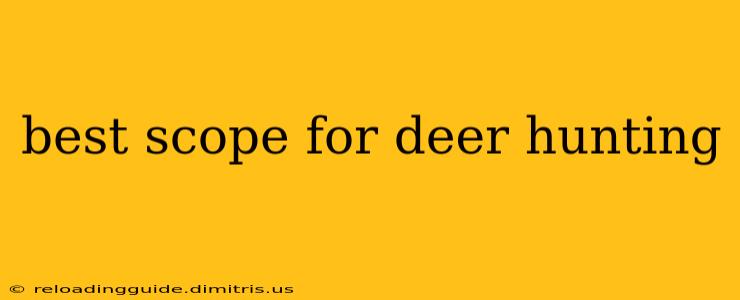Choosing the right scope for deer hunting can significantly impact your success. This isn't just about magnification; it's about finding the perfect balance of features for your specific needs, hunting style, and the environment you'll be hunting in. This guide will walk you through the key factors to consider and help you find the best scope for your next deer hunting adventure.
Understanding Your Hunting Needs
Before diving into specific scope features, it's crucial to assess your hunting style and environment. Consider these factors:
- Hunting Distance: Are you hunting in open fields where long-range shots are common, or in dense woods where shots are typically closer? This will heavily influence the magnification you need.
- Terrain: Will you be hunting in flat terrain or mountainous areas? The type of terrain impacts the stability required from your rifle and scope.
- Lighting Conditions: Are you hunting primarily during dawn and dusk, or in bright daylight? Low-light performance becomes increasingly crucial in low-light conditions.
- Rifle Type: The type of rifle you use influences the recoil, which in turn impacts scope durability and the need for robust construction.
Key Scope Features to Consider
Once you've assessed your hunting needs, you can start evaluating scopes based on these crucial features:
1. Magnification
- Low Magnification (1-4x or 2-7x): Ideal for close-quarters hunting in dense woods. Offers a wide field of view, making it easier to acquire targets quickly.
- Medium Magnification (3-9x or 4-12x): A versatile option suitable for various hunting situations, balancing magnification for longer shots with a usable field of view at lower magnifications.
- High Magnification (6-24x or higher): Best suited for long-range shots in open fields. However, these scopes often come with a narrower field of view and can be less forgiving in low-light conditions.
2. Objective Lens Diameter
The objective lens diameter (the front lens) significantly affects light gathering capabilities. Larger diameters (e.g., 40mm, 50mm) are better in low-light conditions, but they also increase the scope's size and weight.
3. Reticle
The reticle is the crosshairs in your scope. Different reticles serve various purposes. Popular choices include:
- Duplex Reticle: A simple, classic reticle suitable for most hunting scenarios.
- BDC (Bullet Drop Compensator) Reticle: Designed for long-range shooting, compensating for bullet drop at different distances.
- Illuminated Reticle: Helpful for low-light hunting, but battery life is a concern.
4. Turrets
Turret adjustments allow you to dial in precise adjustments for windage and elevation. Look for scopes with:
- Positive Click Adjustments: Provide tactile feedback for each adjustment click, ensuring accuracy.
- Zero Stop: Prevents accidental adjustments below your zero point.
5. Construction and Durability
- Waterproof and Fogproof: Essential for all hunting conditions.
- Shockproof: Robust construction is needed to withstand recoil, especially with powerful rifles.
Top Scope Recommendations (General Examples - Consult Reviews)
While specific product recommendations change rapidly due to new releases, consider scopes from reputable brands known for their quality and durability in the deer hunting market. These often include (but are not limited to) Leupold, Vortex, Nikon, and Bushnell. Look for scopes that fit your budget and hunting needs as determined by the factors described above. Always check current reviews and comparisons before making a purchase.
Conclusion: Choosing the Right Scope is Key
Selecting the best scope for deer hunting is a personal decision based on your individual needs. By carefully considering your hunting style, environment, and budget, along with the key features discussed above, you can confidently choose a scope that enhances your hunting experience and increases your chances of success. Remember to always prioritize safety and responsible hunting practices.

